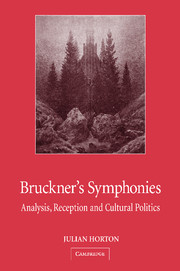Book contents
- Frontmatter
- Dedication
- Contents
- Preface
- 1 Introduction: the critical problem
- 2 Bruckner and late nineteenth-century Vienna: analysis and historical context
- 3 Right-wing cultural politics and the Nazi appropriation of Bruckner
- 4 Bruckner and musical analysis
- 5 Bruckner and the construction of musical influence
- 6 Analysis and the problem of the editions
- 7 Psychobiography and analysis
- 8 Epilogue: Bruckner and his contexts
- Bibliography
- Index
7 - Psychobiography and analysis
Published online by Cambridge University Press: 22 September 2009
- Frontmatter
- Dedication
- Contents
- Preface
- 1 Introduction: the critical problem
- 2 Bruckner and late nineteenth-century Vienna: analysis and historical context
- 3 Right-wing cultural politics and the Nazi appropriation of Bruckner
- 4 Bruckner and musical analysis
- 5 Bruckner and the construction of musical influence
- 6 Analysis and the problem of the editions
- 7 Psychobiography and analysis
- 8 Epilogue: Bruckner and his contexts
- Bibliography
- Index
Summary
In 1956, Donald Mitchell published a review of Hans Redlich's Bruckner and Mahler. Mitchell noted with approval Redlich's skill in the enlightening presentation of biography, and was struck especially by the revelation of the composer's neurotic behaviour, which unseated his prevalent image of mystical detachment: ‘Many English readers will be astonished, as I was, at the “seraphic” Bruckner's neuroses.’ Mitchell, however, neglected to appraise the full extent of Redlich's agenda, which, in a manoeuvre that places Bruckner and Mahler squarely within a persistent trend of reception history, went beyond the exposition of evidence to its psychological explication. For Redlich, the paradoxical aspects of Bruckner's character betrayed vaguely Freudian origins: ‘his is a case of sexual inferiority complex, in need of powerful compensatory satisfactions. Indeed, the peculiarities of Bruckner's psychology and the entanglements of his emotional life can all be traced back to that cause.’ Redlich freely applied notions of obsession as a means of clarifying Bruckner's recurrent manias. The composer's ‘obsessional urge’ to count objects and his ‘unhealthy interest in corpses’ constituted pathological obsessions that replaced the ‘intellectual penetrations into other spheres of human interest’ evident in a healthy psychology.
The task of explaining Bruckner's neuroses psychoanalytically has subsequently been taken up more systematically by the psychiatrist Erwin Ringel, who has gone so far as to suggest that Bruckner suffered from a lifelong mental disorder. Ringel detected an entrenched neurosis, which manifested itself in a variety of symptoms.
- Type
- Chapter
- Information
- Bruckner's SymphoniesAnalysis, Reception and Cultural Politics, pp. 223 - 257Publisher: Cambridge University PressPrint publication year: 2004



